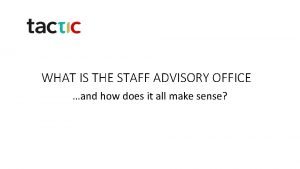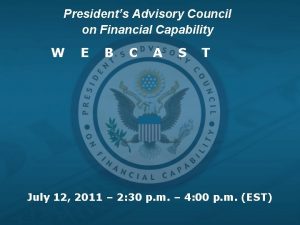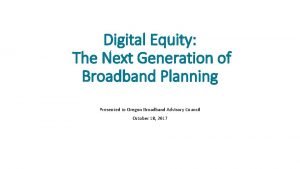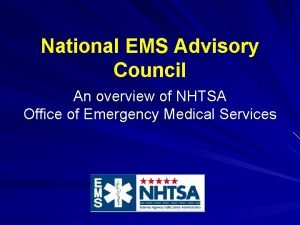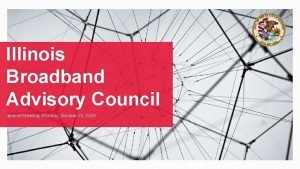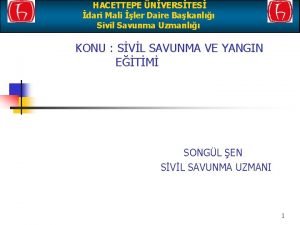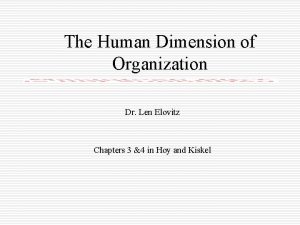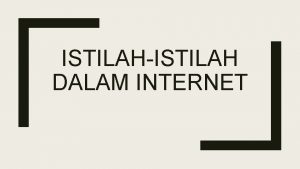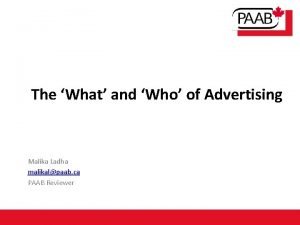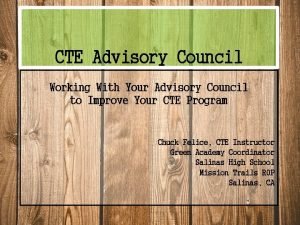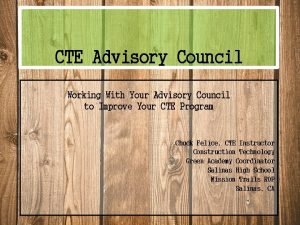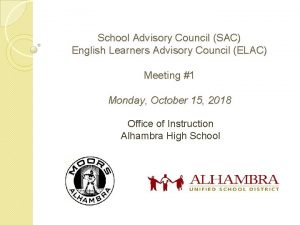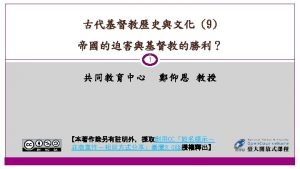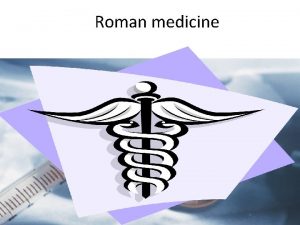Staff Advisory Council Malika Roman Isler Ph D





















- Slides: 21

Staff Advisory Council Malika Roman Isler, Ph. D, MPH February 11, 2015 LOCATION HERE | MAY 12, 2009

• A little about me • Some context for Thrive • Introducing the team • Current Priorities (staff specific)

A little about me… • WFU graduate (‘ 99) – Health & Exercise Science • University of South Carolina – MPH • University of North Carolina at Chapel Hill – Ph. D • Public Health practitioner • Researcher, Administrator, Programmer – Collaborative health promotion and wellbeing • • Universities, health departments, churches, grassroots organizations, private research firms… HIV/AIDS, Reproductive health, Cancer, Diabetes, Genomics, organizational development, quality assurance…

Assumptions about Wellbeing • People can intentionally learn, build and cultivate well-being. • A well-lived life is a life full of meaning and purpose; grounded in self-awareness and infused with inquiry and curiosity. • Well-being involves subjectivity and can be measured with rigorous science. • Facilitating the well-being in others and providing opportunities for learning and growth is a responsibility of everyone involved in the leadership process. George Mason University Center for the Advancement of Well-Being

Eight Dimensions of Wellbeing

The team The Team

Infrastructure Development • Director of Wellbeing – Malika Roman Isler, Ph. D, MPH – Develop a strategic and comprehensive approach to campus wellbeing (students, faculty and staff) – Leverage local, regional, and national collaborative partnerships – Strategic Prevention Framework • Getting at Root Causes at Multiple Levels • Director of Health Promotion – Kevin Harrell, MPH, CHES – Cultivate healthy attitudes and behaviors – Student engagement in health promotion – Peer education – Prevention programming

Infrastructure Development • Safe Office Coordinator – Beth Montplaisir, MA, LPCA, NCC – Sexual & relationship violence response – Short-term counseling – Prevention programming • Alcohol & Substance Abuse Prevention Coordinator – Vacant – Alcohol and substance abuse – Prevention programming – Brief assessment and referral

Infrastructure Development • Project Coordinator – Nikki Villanueva – Project management – Program planning – Student engagement • Campus Life Fellow – Paige Horton – Communications – Social media – Program planning

We are ALL team Thrive! Office of Multicultural Affairs Human Resources Staff Office of Professional & Career Development Pro Humanitate Institute University Police University Counseling Center Professional Faculty Development Center Communications & External Relations Students Dean of the College Student Health Service Campus Recreation Office of the Chaplain Learning Residence Life & Assistance Center Housing

Prevention Approach Wellbeing: An Ecological Approach Societal Community Organizational Interpersonal What is the distribution of resources, opportunities, and policies? What are the community level norms and practices? How is the built environment? How is organizational culture, leadership values, and institutional policy playing a role? What’s happening between individuals (Peer circles, faculty/staff to student relationships)? Intrapersonal What’s happening within individuals (Personal histories, attitudes, beliefs, behaviors)?

Organizing Framework Pillars of Thrive Infrastructure Programs • One-offs • Ongoing • Evidencebased • • • Staffing Collaborative Networks Systems Research Services • Independent • Collaborative Pilots • CHOICES • Safe

Mission (working) Thrive is Wake Forest’s comprehensive wellbeing initiative. As a venture owned by the entire campus community, Thrive engages students, faculty, and staff to better cope with adversity, build rewarding relationships and lives with a sense of purpose. Through collaborative programs, infrastructure building, research, and services, Thrive offers the skills, knowledge and perspective necessary to maintain a healthy, harmonious, and balanced life.

Wellbeing Strategic Directions Lead a comprehensive approach to student and community wellbeing 1. Integrate the Thrive campaign into all areas of campus and academic life. 2. Create or enhance peer education programs to address our most salient wellbeing challenges (e. g. stress, alcohol, sexual assault, sleep, nutrition). 3. Create Wellbeing Ambassadors throughout student organizations and campus departments to help share Thrive strategies. 4. Provide opportunities for students, faculty and staff to learn about and demonstrate behaviors that are consistent with the eight dimensions of Thrive. 5. Position WFU to serve as an innovator, leader, and national resource for wellbeing in higher education by publicizing and sharing the story of Thrive.

Priority Area Priority: Define the state of wellbeing of the Wake Forest community • Mapping current wellbeing offerings • Programs and services • Faculty and staff benefits • Evaluating current campus assessments • Expanding existing assessments (e. g. National College Health Assessment) • Identify faculty and staff wellbeing assessment tool Indicates efforts already underway

Priority Area Priority: Increase visibility and understanding of the Thrive initiative Dimensions by the Month Campaign Highlights 2 dimensions each month Interactive Workshops • Mindfulness Training • Financial Wellbeing • Myers-Briggs • Family Safety Planning Partnerships • Professional Development Center • Office of the Chaplain • University Counseling Center Programs • Zumbathon • Safe Spring Break Contests • Faculty & Staff Wellbeing Recognition Thought Exercises • Where do you see your career in 5 -10 years? Blogs, Tips & Tools • Time management • Strategies for stress reduction • Building healthy relationships • Drinking Responsibly

Social and Spiritual Wellbeing • • • Faculty/Staff Wellbeing Contest! Nominations due February 23 rd February 9 - February 12 th: Tie a Yellow Ribbon Week – Wed: Sing Out at Shorty’s (7 pm); Thurs: Speak Out at Wait Chapel (68 pm) February 10, 17, 24: Puppy Love Tuesdays February 12, 26: Wellbeing Dimension Discovery Tables – In Benson from 12: 30 -2 pm, Thank you notes, personal prayers and meditations (greater life satisfaction, optimism, connectedness with others) February 18: Thrive at 5 – In Shorty’s, free food and wellbeing conversation with the team February 19: Wellbeing Workshops – MBTI & Power of Positive Affirmations February 20: Tea Party – Reynolda Green room from 3 -5 pm for food, fun and games! February 21: Ted. X - Hearts & Minds February 23: Faculty/Staff salsa hour and Intro to Zen Meditation:

Priority Area Priority: Increase visibility and understanding of the Thrive initiative • Dimensions by the month campaign – – Experiential wellbeing opportunities Highlight faculty and staff thriving in each dimension • Collaborative partnerships • Social media presence • Use of Thrive logo across campus Indicates efforts already underway • Website restructuring – interactive, toolkit • Wellbeing mapping and awareness • Thrive @ 5 • National blogspot • Office designation campaign • New employee orientation

Priority Area Provide opportunities for students, faculty and staff to learn about and demonstrate behaviors that are consistent with the eight dimensions of Thrive. • • Annual community events Monthly “snack-sized” offerings across 8 dimensions Use of technological platforms Identify individualized wellbeing assessment for students, faculty, and staff, offer wellbeing coaching Offer 1 -2 core programs under each dimension Policies to support faculty and staff engaging in wellbeing (e. g. PTO) Wellbeing ambassadors program Program fund for wellbeing ideas Indicates efforts already underway

Questions for the SAC • What do you see as wellbeing priority areas for staff? • What are the best strategies for incorporating staff voices into Thrive? • What are the best strategies for helping staff feel ownership of Thrive?

Questions or Comments? Feel free to contact us at: thrive@wfu. edu (336) 758 -4065
 Malika roman isler
Malika roman isler Staff advisory
Staff advisory Source selection plan
Source selection plan German advisory council on global change
German advisory council on global change President's advisory council on financial capability
President's advisory council on financial capability Oregon broadband advisory council
Oregon broadband advisory council Ciogino sach
Ciogino sach National ems advisory council
National ems advisory council Cadet advisory council
Cadet advisory council Illinois broadband advisory council
Illinois broadband advisory council Ağır ceza mahkemesi dereceleri
Ağır ceza mahkemesi dereceleri Zamanında yapılmayan işler ile ilgili sözler
Zamanında yapılmayan işler ile ilgili sözler Senin tek nazenine nazenin işler münasiptir
Senin tek nazenine nazenin işler münasiptir Kalem mevzuati adalet bakanlığı
Kalem mevzuati adalet bakanlığı Lorenz isler
Lorenz isler Işler kitabevi franchise
Işler kitabevi franchise Vasinin izin almadan yapabileceği işler
Vasinin izin almadan yapabileceği işler Hacettepe idari mali işler
Hacettepe idari mali işler National staff development council
National staff development council Malika kishwar
Malika kishwar Fatin hamama
Fatin hamama Malika ladha
Malika ladha

